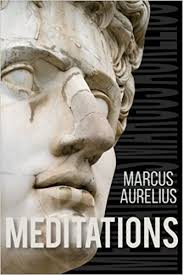Meditations Page #28
Meditations is a series of personal writings by Marcus Aurelius, Roman Emperor from 161 to 180 AD, recording his private notes to himself and ideas on Stoic philosophy. Marcus Aurelius wrote the 12 books of the Meditations in Koine Greek as a source for his own guidance and self-improvement.
XXIII. Out of Plato. 'He then whose mind is endowed with true magnanimity, who hath accustomed himself to the contemplation both of all times, and of all things in general; can this mortal life (thinkest thou) seem any great matter unto him? It is not possible, answered he. Then neither will such a one account death a grievous thing? By no means.' XXIV. Out of Antisthenes. 'It is a princely thing to do well, and to be ill-spoken of. It is a shameful thing that the face should be subject unto the mind, to be put into what shape it will, and to be dressed by it as it will; and that the mind should not bestow so much care upon herself, as to fashion herself, and to dress herself as best becometh her.' XXV. Out of several poets and comics. 'It will but little avail thee, to turn thine anger and indignation upon the things themselves that have fallen across unto thee. For as for them, they are not sensible of it, &c. Thou shalt but make thyself a laughing-stock; both unto the Gods and men, &c. Our life is reaped like a ripe ear of corn; one is yet standing and another is down, &c. But if so be that I and my children be neglected by the gods, there is some reason even for that, &c. As long as right and equity is of my side, &c. Not to lament with them, not to tremble, &c.' XXVI. Out of Plato. 'My answer, full of justice and equity, should be this: Thy speech is not right, O man! if thou supposest that he that is of any worth at all, should apprehend either life or death, as a matter of great hazard and danger; and should not make this rather his only care, to examine his own actions, whether just or unjust: whether actions of a good, or of a wicked man, &c. For thus in very truth stands the case, O ye men of Athens. What place or station soever a man either hath chosen to himself, judging it best for himself; or is by lawful authority put and settled in, therein do I think (all appearance of danger notwithstanding) that he should continue, as one who feareth neither death, nor anything else, so much as he feareth to commit anything that is vicious and shameful, &c. But, O noble sir, consider I pray, whether true generosity and true happiness, do not consist in somewhat else rather, than in the preservation either of our, or other men's lives. For it is not the part of a man that is a man indeed, to desire to live long or to make much of his life whilst he liveth: but rather (he that is such) will in these things wholly refer himself unto the Gods, and believing that which every woman can tell him, that no man can escape death; the only thing that he takes thought and care for is this, that what time he liveth, he may live as well and as virtuously as he can possibly, &c. To look about, and with the eyes to follow the course of the stars and planets as though thou wouldst run with them; and to mind perpetually the several changes of the elements one into another. For such fancies and imaginations, help much to purge away the dross and filth of this our earthly life,' &c. That also is a fine passage of Plato's, where he speaketh of worldly things in these words: 'Thou must also as from some higher place look down, as it were, upon the things of this world, as flocks, armies, husbandmen's labours, marriages, divorces, generations, deaths: the tumults of courts and places of judicatures; desert places; the several nations of barbarians, public festivals, mournings, fairs, markets.' How all things upon earth are pell-mell; and how miraculously things contrary one to another, concur to the beauty and perfection of this universe. XXVII. To look back upon things of former ages, as upon the manifold changes and conversions of several monarchies and commonwealths. We may also foresee things future, for they shall all be of the same kind; neither is it possible that they should leave the tune, or break the concert that is now begun, as it were, by these things that are now done and brought to pass in the world. It comes all to one therefore, whether a man be a spectator of the things of this life but forty years, or whether he see them ten thousand years together: for what shall he see more? 'And as for those parts that came from the earth, they shall return unto the earth again; and those that came from heaven, they also shall return unto those heavenly places.' Whether it be a mere dissolution and unbinding of the manifold intricacies and entanglements of the confused atoms; or some such dispersion of the simple and incorruptible elements... 'With meats and drinks and divers charms, they seek to divert the channel, that they might not die. Yet must we needs endure that blast of wind that cometh from above, though we toil and labour never so much.' XXVIII. He hath a stronger body, and is a better wrestler than I. What then? Is he more bountiful? is he more modest? Doth he bear all adverse chances with more equanimity: or with his neighbour's offences with more meekness and gentleness than I? XXIX. Where the matter may be effected agreeably to that reason, which both unto the Gods and men is common, there can be no just cause of grief or sorrow. For where the fruit and benefit of an action well begun and prosecuted according to the proper constitution of man may be reaped and obtained, or is sure and certain, it is against reason that any damage should there be suspected. In all places, and at all times, it is in thy power religiously to embrace whatsoever by God's appointment is happened unto thee, and justly to converse with those men, whom thou hast to do with, and accurately to examine every fancy that presents itself, that nothing may slip and steal in, before thou hast rightly apprehended the true nature of it. XXX. Look not about upon other men's minds and understandings; but look right on forwards whither nature, both that of the universe, in those things that happen unto thee; and thine in particular, in those things that are done by thee: doth lead, and direct thee. Now every one is bound to do that, which is consequent and agreeable to that end which by his true natural constitution he was ordained unto. As for all other things, they are ordained for the use of reasonable creatures: as in all things we see that that which is worse and inferior, is made for that which is better. Reasonable creatures, they are ordained one for another. That therefore which is chief in every man's constitution, is, that he intend the common good. The second is, that he yield not to any lusts and motions of the flesh. For it is the part and privilege of the reasonable and intellective faculty, that she can so bound herself, as that neither the sensitive, nor the appetitive faculties, may not anyways prevail upon her. For both these are brutish. And therefore over both she challengeth mastery, and cannot anyways endure, if in her right temper, to be subject unto either. And this indeed most justly. For by nature she was ordained to command all in the body. The third thing proper to man by his constitution, is, to avoid all rashness and precipitancy; and not to be subject to error. To these things then, let the mind apply herself and go straight on, without any distraction about other things, and she hath her end, and by consequent her happiness.
Translation
Translate and read this book in other languages:
Select another language:
- - Select -
- 简体中文 (Chinese - Simplified)
- 繁體中文 (Chinese - Traditional)
- Español (Spanish)
- Esperanto (Esperanto)
- 日本語 (Japanese)
- Português (Portuguese)
- Deutsch (German)
- العربية (Arabic)
- Français (French)
- Русский (Russian)
- ಕನ್ನಡ (Kannada)
- 한국어 (Korean)
- עברית (Hebrew)
- Gaeilge (Irish)
- Українська (Ukrainian)
- اردو (Urdu)
- Magyar (Hungarian)
- मानक हिन्दी (Hindi)
- Indonesia (Indonesian)
- Italiano (Italian)
- தமிழ் (Tamil)
- Türkçe (Turkish)
- తెలుగు (Telugu)
- ภาษาไทย (Thai)
- Tiếng Việt (Vietnamese)
- Čeština (Czech)
- Polski (Polish)
- Bahasa Indonesia (Indonesian)
- Românește (Romanian)
- Nederlands (Dutch)
- Ελληνικά (Greek)
- Latinum (Latin)
- Svenska (Swedish)
- Dansk (Danish)
- Suomi (Finnish)
- فارسی (Persian)
- ייִדיש (Yiddish)
- հայերեն (Armenian)
- Norsk (Norwegian)
- English (English)
Citation
Use the citation below to add this book to your bibliography:
Style:MLAChicagoAPA
"Meditations Books." Literature.com. STANDS4 LLC, 2025. Web. 26 Feb. 2025. <https://www.literature.com/book/meditations_76>.








Discuss this Meditations book with the community:
Report Comment
We're doing our best to make sure our content is useful, accurate and safe.
If by any chance you spot an inappropriate comment while navigating through our website please use this form to let us know, and we'll take care of it shortly.
Attachment
You need to be logged in to favorite.
Log In